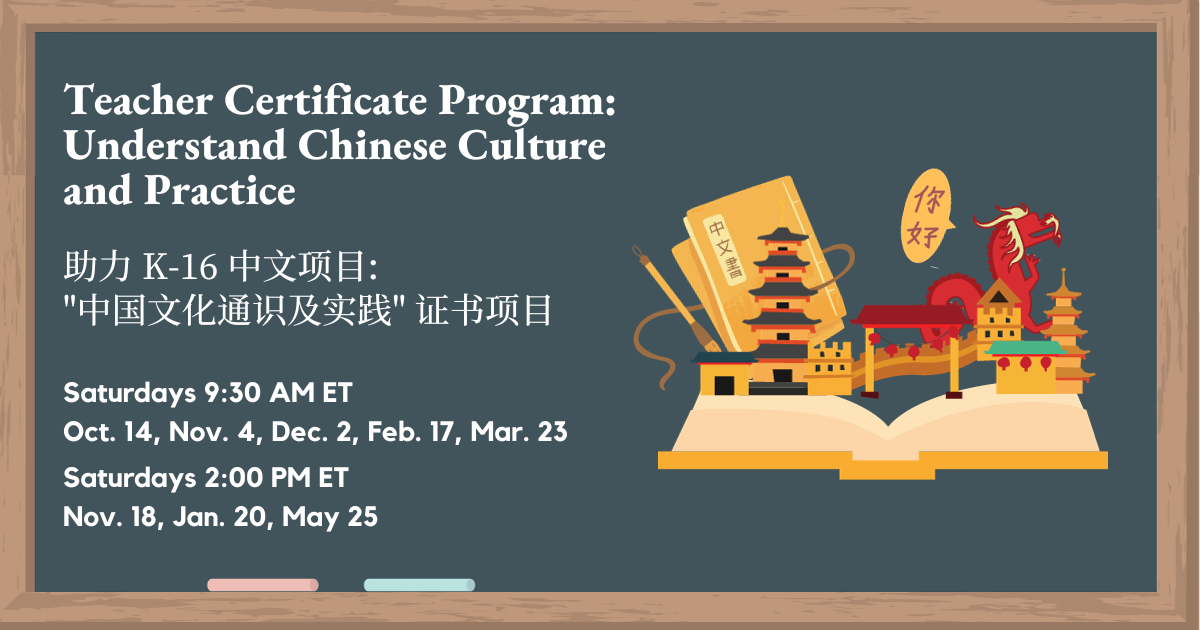
China Institute
In Partnership with East China Normal University
Jointly designed by China Institute in New York City, and East China Normal University in Shanghai, the Teacher Certificate Program: Understand Chinese Culture and Practice is an innovative certificate program for K-16 teachers of Chinese as a second language to expand and advance a deeper understanding of the foundations of Chinese culture, making connections of traditions and contemporary applications, and support participants with skillsets and resources to engage with a school community that embraces diversity and cultural responsiveness.
From Fall 2023 to Spring 2024, monthly online seminars present carefully selected cultural topics by renowned experts, each followed by guided discussions. In addition, participants have the opportunity to join accompanying pedagogical workshops guided by master teaching experts, along with in-depth coaching, to practice bridging cultural content and practical skillsets needed in your classroom and school.
Welcome all K-16 in-service and pre-service teachers of Chinese as a second language in foreign language, dual or immersion programs to join. Teachers of other subjects may find topics of interest and are welcome too!
According to the World-Readiness Standards for Learning Languages by the American Council on the Teaching of Foreign Languages, all language teaching must include 5 Cs (Communication, Cultures, Connections, Comparisons and Communities). For more specific goal areas and standards, please visit World-ReadinessStandardsforLearningLanguages.pdf.
This seminar series will provide participants with subject content that meets the “Cultures” goal area of the World-Readiness Standards for Learning Languages. The goal is to bring to world language learners a global competence for their future careers and experiences.
Participants can choose sessions to enroll in monthly. Upon completing the pedagogical workshop and in-depth coaching process, selected teacher participants will be invited to present at a China Institute Learn, Share and Lead Workshop.
For questions, please contact Yongqiang Lin at ylin@chinainstitute.org
Spring 2024 Programs
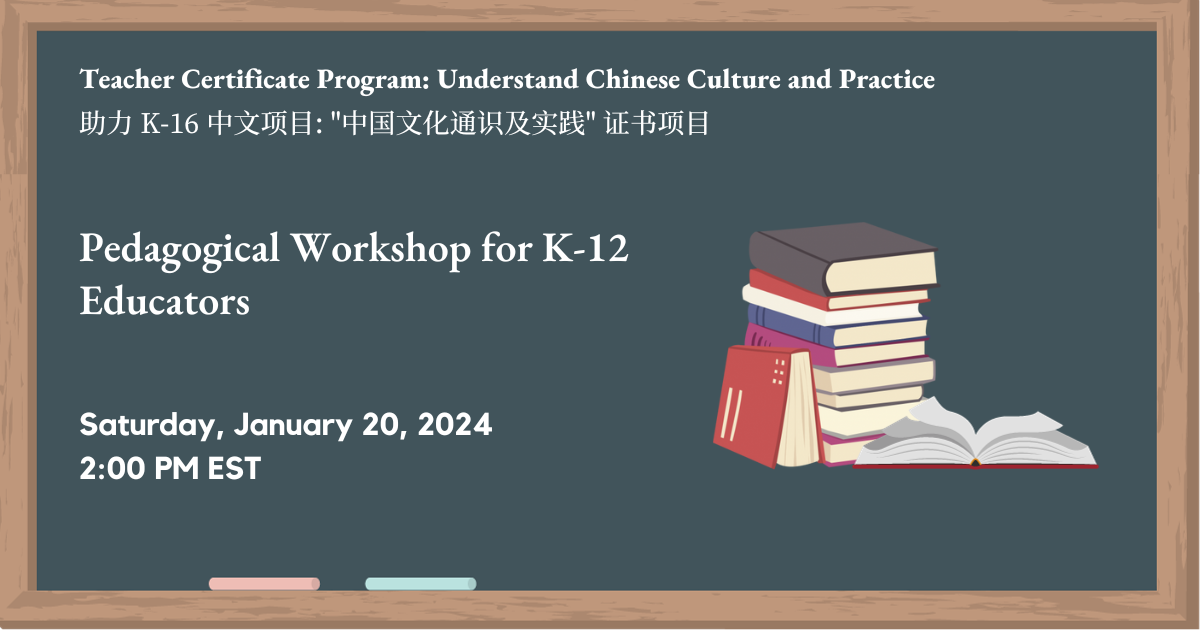
How can Chinese language teachers bring a deeper understanding of Chinese cultural content to their classrooms? This participant-centered workshop is designed to help teachers develop activities integrating language and culture based on the content learned through previous seminars. Led by master teacher trainer Dr. Wei-ling Wu, workshop participants will select one cultural topic to focus on and design a sample activity plan integrating the cultural content into their classroom teaching targeting their own students.
In addition to expert guidance and peer support to develop an activity plan ready for implementation in your own classroom, participating teachers will have the opportunity to present at a future China Institute Learn, Share, and Lead Workshop, aiming to build a community of devoted K-12 teachers who are passionate about and actively engaged in the exploration of innovative approaches to effectively achieve learning goals encompassing both culture and language.
This workshop is limited to 25 participants.
Applicants must meet the following requirements for consideration:
- Passionate about teaching Chinese culture in their classrooms
- Committed to actively participating in workshop discussions
- Submit a proposal by Friday 5:00 PM, January 5, using the provided Proposal Form
- Complete the post workshop survey
Please submit the completed proposal to Yongqiang Lin, ECNU Guest Faculty and Program Coordinator, China Institute, at ylin@chinainstitute.org.
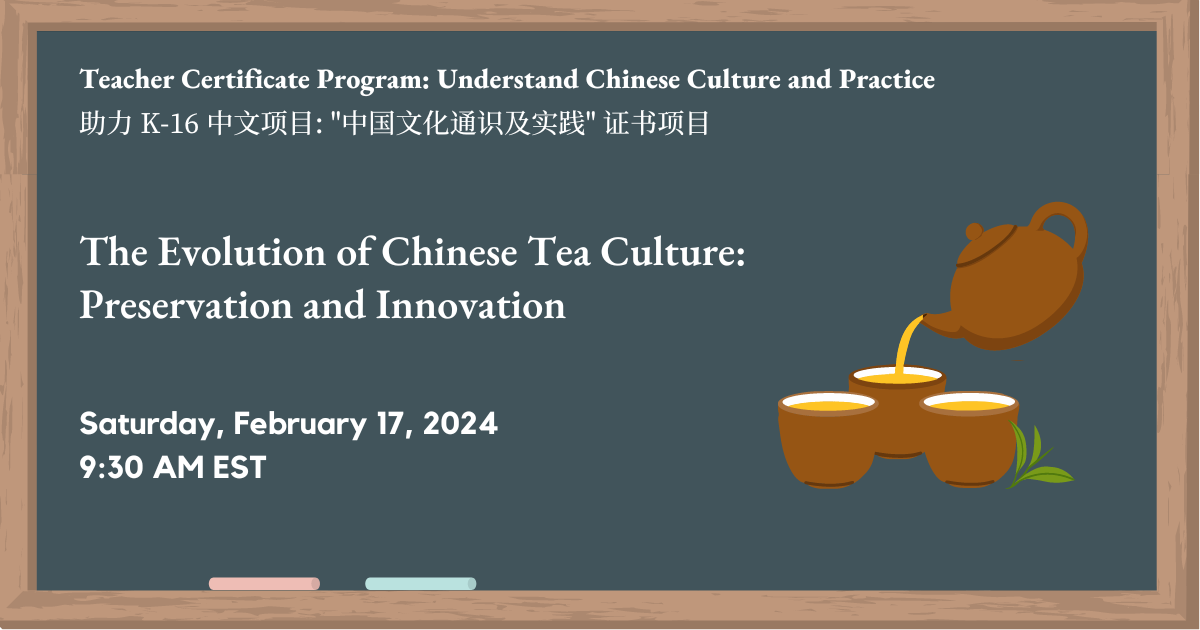
Tea, a humble yet profound beverage, stands as a cultural symbol, embodying a unique facet of Chinese heritage. The production of tea, the intricate rituals of tea drinking, and the tools associated with it serve as mediums for cultural expression in China. Under the guidance of Prof. Yanchun Huang, this seminar endeavors to delve into the historical evolution and distinctive features of Chinese tea culture. Topics include the emergence and innovation of the Way of Tea, the art of tea ceremony, the well-being concepts embedded in China’s tea culture that is also globally disseminated.
Post-lecture, teacher participants will actively engage in a live discussion led by Prof. Robin Harvey. This interactive session aims to bridge teaching practices and thoughts, fostering a connection with the cultural theme explored during the seminar.
This two-hour online seminar will be in Chinese.
该讲座为中文。
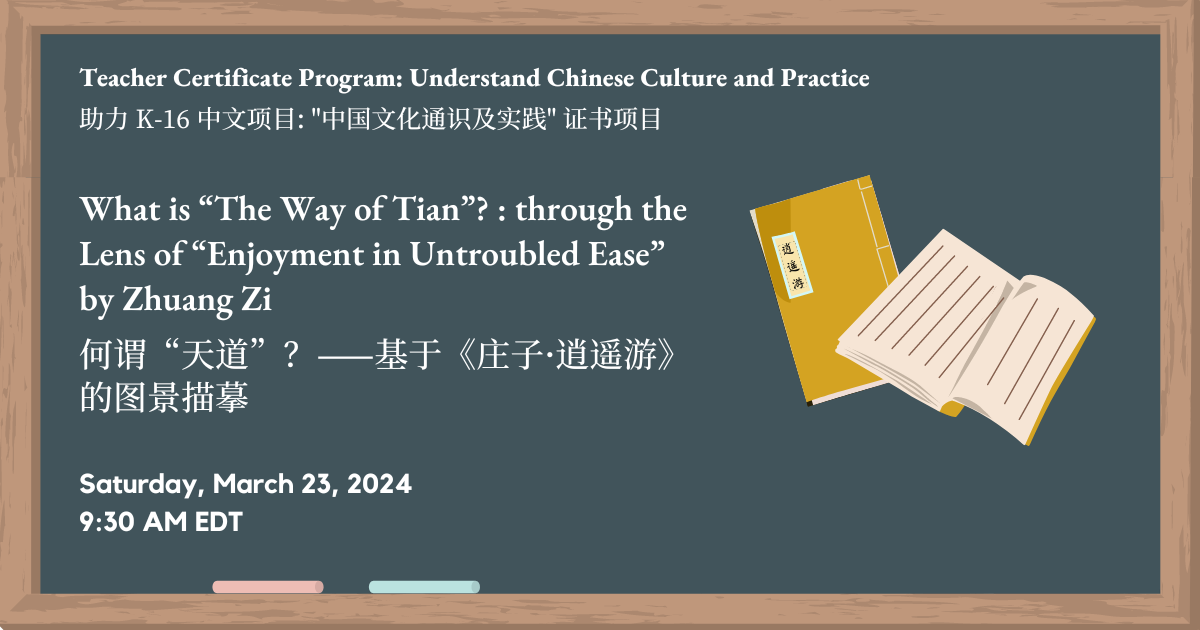
“The Way of Tian” (天道) stands as one of the most core concepts embodying the essence of Chinese culture. In this seminar, we will delve into its logic and nature through the lens of Zhuang Zi’s Daoist classic “Enjoyment in Untroubled Ease” (逍遥游), supplemented by literature and visual materials. The seminar will attempt to present an interpretation of the “The Way of Tian”, illustrating its significance in shaping various aspects of Chinese culture, including architecture, painting, and imagery. Led by Prof. Linbo Cai from East China Normal University, this seminar aims to equip teachers with a deeper understanding of this core tenet of Chinese philosophy and culture, enriching their pedagogical approach.
Teacher participants will actively engage in a live discussion following the lecture, led by Prof. Mingquan Wang, Executive Director, New England Chinese Language Teachers Association. This interactive session aims to bridge teaching practices and thoughts, fostering a connection with the cultural theme explored during the seminar.
This two-hour online seminar will be in Chinese.
该讲座为中文。
Fall 2023 Programs
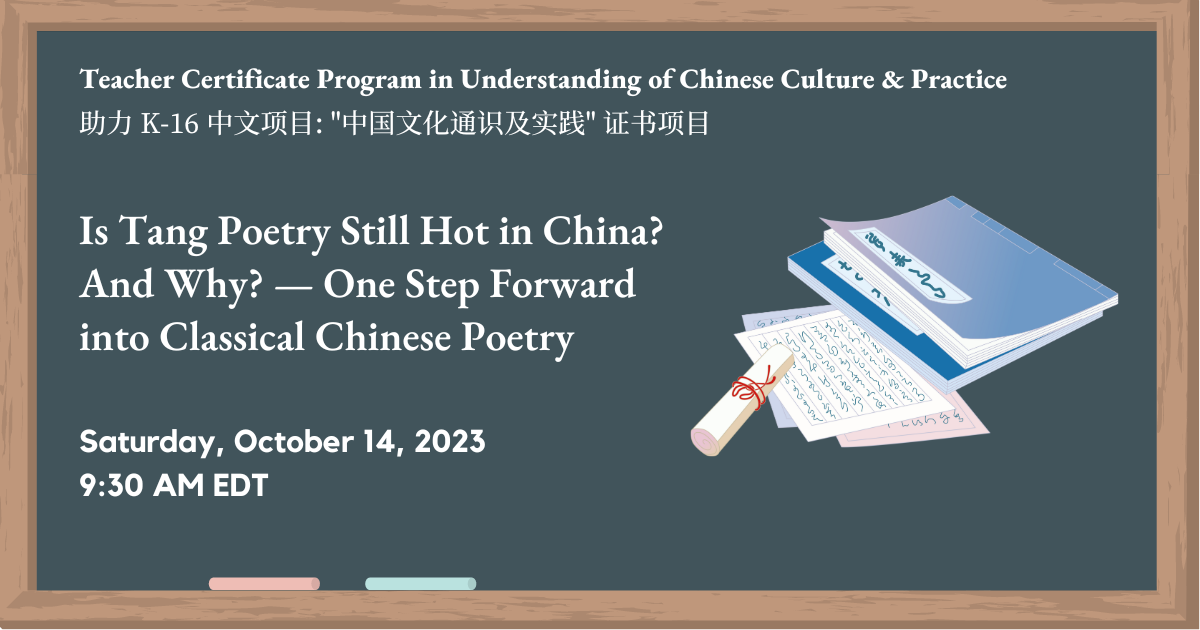
故人西辞黄鹤楼,You have left me behind, old friend, at the Yellow Crane Terrace,
烟花三月下扬州。On your way to visit Yangzhou in the misty month of flowers;
孤帆远影碧空尽,Your sail, a single shadow, becomes one with the blue sky,
唯见长江天际流。Till now I see only the river, on its way to heaven.
This quatrain, A Farewell to Meng Hao-jan on His Way to Yang-chou (黄鹤楼送孟浩然之广陵, English translation by Witter Bynner, 1881 – 1968), written by Tang poet Li Bai (701 – 762), represents a golden era of Chinese classical poetry, when the Complete Anthology of Tang Poetry compiled more than fifty thousand poems by over 2,000 poets, each a star with lasting impact in China’s literary history. For more than 1,200 years, classical poetry continues to inspire poets, scholars, and literati alike in China and beyond. In recent years, classical poetry has made quite a comeback in China’s pop culture, transforming ancient poets into characters in films, TV series, music, art and more.
From Ode to the Goose (《咏鹅》) to Guan Guan Go the Ospreys (《关雎》), there are many great poems that can be introduced to students of various ages to build their intercultural competence through classical poetry when studying Chinese language. For many Chinese language teachers, the richness of great classical poems presents both an advantage and a challenge: while there is certainly no lack of authentic resource to expose students to this art of Chinese language, what to expect the students to grasp by learning classical poems? What is the gist of classic poetry that can be reasonably understood and delivered in limited time? Can we, Chinese language teachers, articulate why classical poetry has such enduring impact, and convey to our students its beauty?
This seminar, led by Professor Xiaoming Hu, Director of the Institute of Chinese Literature, East China Normal University, is the beginning of a journey to step deeper into the world of Chinese classical poetry. Looking back from its peak time in Tang Dynasty (618-907) to its fountainhead, Book of Songs (《诗经》, 11th to 7th BCE), participants are to understand deeper of the classical poetry as a literary form, examine its power of shaping Chinese culture, and collectively explore ways in which learning can be made possible in a second language classroom.
This two-hour online seminar will be in Chinese. 该讲座为中文。

故人西辞黄鹤楼,You have left me behind, old friend, at the Yellow Crane Terrace,
烟花三月下扬州。On your way to visit Yangzhou in the misty month of flowers;
孤帆远影碧空尽,Your sail, a single shadow, becomes one with the blue sky,
唯见长江天际流。Till now I see only the river, on its way to heaven.
This quatrain, A Farewell to Meng Hao-jan on His Way to Yang-chou (黄鹤楼送孟浩然之广陵, English translation by Witter Bynner, 1881 – 1968), written by Tang poet Li Bai (701 – 762), represents a golden era of Chinese classical poetry, when the Complete Anthology of Tang Poetry compiled more than fifty thousand poems by over 2,000 poets, each a star with lasting impact in China’s literary history. For more than 1,200 years, classical poetry continues to inspire poets, scholars, and literati alike in China and beyond. In recent years, classical poetry has made quite a comeback in China’s pop culture, transforming ancient poets into characters in films, TV series, music, art and more.
From Ode to the Goose (《咏鹅》) to Guan Guan Go the Ospreys (《关雎》), there are many great poems that can be introduced to students of various ages to build their intercultural competence through classical poetry when studying Chinese language. For many Chinese language teachers, the richness of great classical poems presents both an advantage and a challenge: while there is certainly no lack of authentic resource to expose students to this art of Chinese language, what to expect the students to grasp by learning classical poems? What is the gist of classic poetry that can be reasonably understood and delivered in limited time? Can we, Chinese language teachers, articulate why classical poetry has such enduring impact, and convey to our students its beauty?
This seminar, led by Professor Xiaoming Hu, Director of the Institute of Chinese Literature, East China Normal University, is the beginning of a journey to step deeper into the world of Chinese classical poetry. Looking back from its peak time in Tang Dynasty (618-907) to its fountainhead, Book of Songs (《诗经》, 11th to 7th BCE), participants are to understand deeper of the classical poetry as a literary form, examine its power of shaping Chinese culture, and collectively explore ways in which learning can be made possible in a second language classroom.
This two-hour online seminar will be in Chinese. 该讲座为中文。
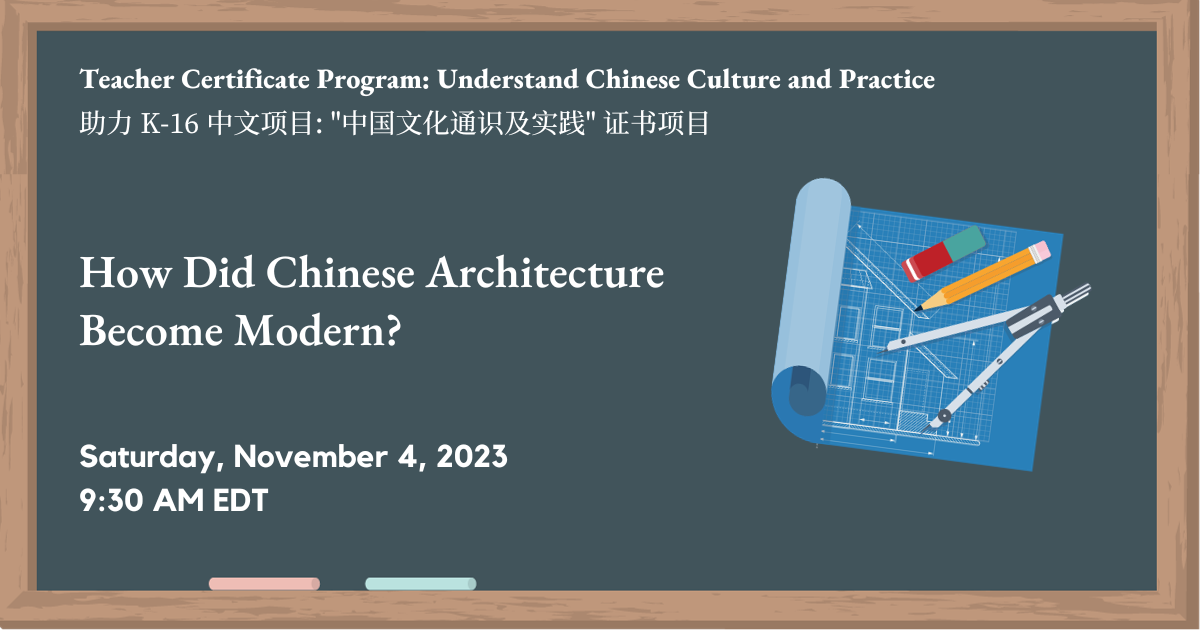
What makes a Chinese building Chinese?
How was Chinese architecture transformed in the early 20th century?
What’s the impact of Chinese architecture in the world? And,
How does the Chinese architecture tradition influence buildings of our time?
Led by Professor Nancy Steinhardt, this seminar will begin with an introduction to Chinese architecture, including the principles of Chinese construction and features to look for in Chinese buildings. It will show where these features are found in the Forbidden City and then turn to the 20th century, when the participants will also learn the dramatic story of how architects transformed the built environment of China during decades of political transition and war, and how China’s own modern architecture came to be built.
This two-hour online seminar will be in Chinese.
该讲座为中文。
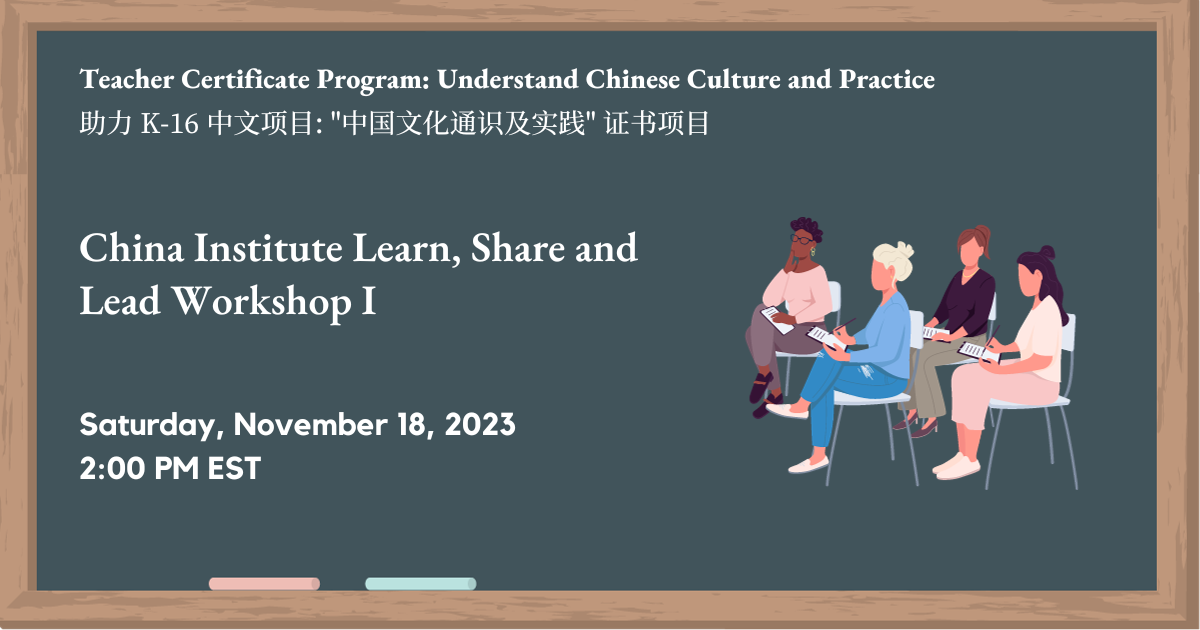
“Culture” constitutes a fundamental component among the 5Cs outlined in the World-Readiness Standards for Learning Languages by the American Council on the Teaching of Foreign Languages, however exploring the integration of culture into language instruction within K-12 classrooms raises numerous inquiries.
To respond to the need, China Institute, in partnership with ECNU, launched The Teacher Certificate Program: Understanding Chinese Culture and Practice, which consists of two components: 1) monthly cultural seminars to help teachers gain a deeper understanding of foundational elements of Chinese culture, and 2) pedagogically workshops integrating cultural activities into K-12 classroom teaching. In past months for the first phase, cultural seminars covered topics on mythology, brush painting and music, and a cohort of enthusiastic Chinese language teachers joined the pedagogical workshop to develop cultural projects.
On November 18th, we invite you to participate in the inaugural session of the China Institute Learn, Share, and Lead Workshop series, designed to build a community of devoted K-12 teachers who are passionate about and actively engaged in the exploration of innovative approaches to effectively achieve learning goals encompassing both culture and language.
Five Chinese language teachers from our first cohort will showcase their cultural projects. These projects cover a range of captivating topics, from mythology to music, each carefully planned under expert guidance and thoughtfully implemented in their respective classrooms in New York, New Jersey, California, and Massachusetts. Through the sharing of their experiments, valuable reflections, and personal learning journeys, we extend a warm invitation to all K-12 teachers of Chinese language and culture to join us in this dynamic program for an engaging and enriching discussion.
Come and join the conversations with our speakers to become an active part of this community.
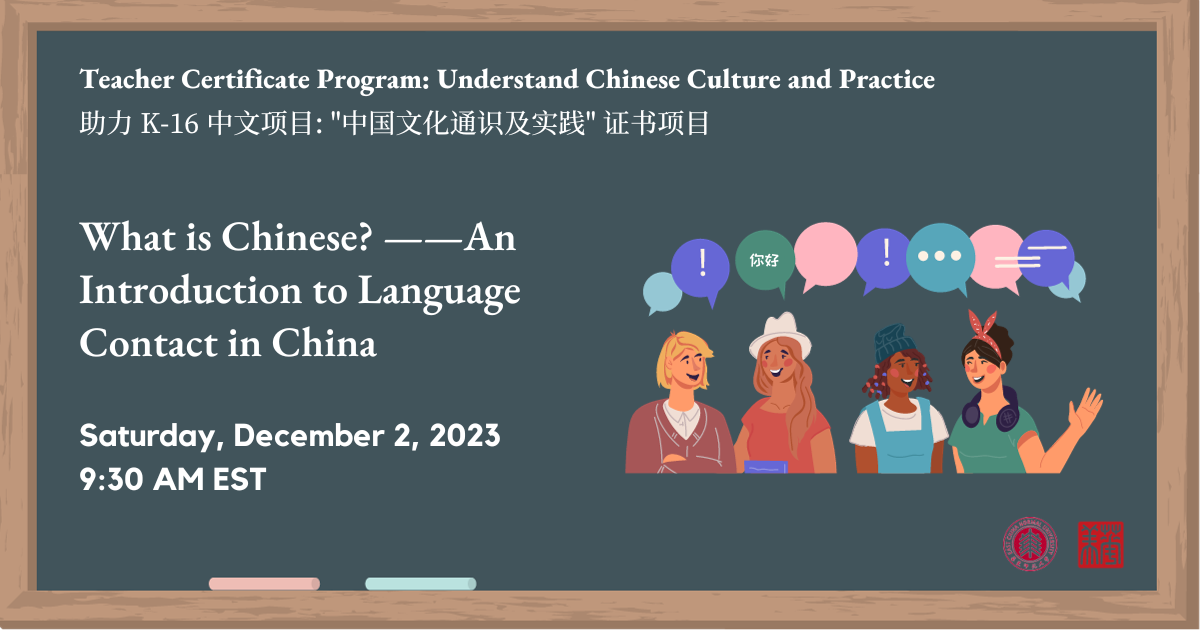
What defines the Chinese language? Do all Chinese speak Mandarin?
Do all Chinese people speak Chinese? Is the Chinese language exclusive to Chinese nationals?
In this lecture, Professor Mingjie Li from East China Normal University will provide an overview of language contact in China. Drawing upon an introduction to Chinese dialects and the distribution of minority languages in China, Prof. Li will delve into the dynamic and inclusive nature of the Chinese language system, and underscore the cultural diversity it fosters, exemplified through multilingualism, the incorporation of loanwords, and other linguistic usages.
This two-hour online seminar will be in Chinese.
该讲座为中文。
Speaker Bio
Xiaoming Hu 胡晓明
Tenure professor at East China Normal University (ECNU) and doctoral supervisor of Chinese literature; Director of ECNU Library and the Institute of Literature; senior visiting scholar at Department of East Asian languages and Civilizations at Harvard University in 2010, and the University of British Columbia in Canada in 2011; Visiting professor of the Taiwan National Central University in 2011 and the Chinese University of Hong Kong in 2015; Deputy Director of the Institute of Chinese Modern Thought and Culture; Research Fellow of the International Center for Studies of Chinese Civilization, Fudan University; Nanshan professor of the China Academy of Art; Director of the Chinese Ancient Literary Theory Society.
Prof. Hu’s research focuses on Chinese cultural poetics, with publications of books including “The Spirit of Chinese Poetics “, ” The Moon of Wanchuan: The Spiritual Realm of Chinese Landscape Poetry “, ” Spiritual Roots and the Seed of Love: A Study of Pre-Qin Literary Thoughts “, ” Poetry and Cultural Minds”, “Cultural Identification” and ” Jiangnan Literary Poetics”. Pro. Hu is also the chief editor of the book “Chinese Classics Lecture and Reading Series”, also a course rewarded as National Excellent Course in China.
Chunyan Huang 黄纯艳
Chunyan Huang, a distinguished professor at East China Normal University, holds the Zijiang Scholar position. He also serves as the Vice President of the Chinese Society for Historians of China’s Foreign Relations, Vice President of the Chinese Society for Maritime History, and Vice President of the Chinese Association for Song Dynasty Studies, among other roles.
Mingjie Li 李明洁
Mingjie Li, PhD in Chinese Linguistics and Philology, Professor and doctoral supervisor at East China Normal University. She worked in the Chinese Department at ECNU from 1991 to 2015 and then transitioned to the School of Social Development in 2015. Her professional experience includes serving as a council member of the Shanghai Language Association from 2006 to 2019, acting as a consultant for the Shanghai Municipal Education Examination Institute from 2011 to 2015, and coordinating Chinese language and Chinese culture courses at the Institute De Management Europe Asie (Quimper, France) in 1999. Additionally, she led the Mandarin Teacher Training Program at the Hong Kong Institute of Education (now the Education University of Hong Kong) in 2003. Dr. Li has authored linguistic and applied linguistic books, such as “Metacognition and Linking Structures of Discourse” ” 100 Examples of Chinese Grammar” and “New Perspectives on Oral Communication”. She has also contributed to the development of textbooks and reference books, including “High School Chinese” (East China Normal University edition) and “Teaching Methods for the New Curriculum of High School Chinese” (Higher Education Press edition).
Nancy S. Steinhardt
NANCY S. STEINHARDT is Professor of East Asian Art and Curator of Chinese Art at the University of Pennsylvania. She has broad research interests in the art and architecture of China and China’s border regions, and on-going field projects in China, Korea, Japan, and Mongolia. Steinhardt is author, editor, or translator of fifteen books, including Yuan: Chinese Architecture in a Mongol Empire (2023); The Borders of Chinese Architecture (2022); Chinese Architecture: A History (2019), winner of the Hitchcock Award for the best book in Architectural History of 2019; China’s Early Mosques (2015); Chinese Architecture in an Age of Turmoil, 200-600 (2014); Chinese Architecture and the Beaux-Arts (2011); Liao Architecture (1997); and Chinese Imperial City Planning (1990); and more than 100 scholarly articles or essays. In 2019 she received the Distinguished Teacher of Art History from the College Art Association and the Provost’s Award for Distinguished Ph. D. Teaching and Mentorship from the University of Pennsylvania. Steinhardt is a member of the Art Committee of China Institute.
Wei–ling Wu 吴威玲
Dr. Wei–ling Wu (Ph.D. University of Pennsylvania), teacher of Chinese, consultant, and trainer of Chinese language teachers.
A master Chinese teacher, Dr. Wu taught in K–12 schools in the United States for twenty-five years. Over her long career as a teacher trainer, Dr. Wu has taught courses for teachers of Chinese at New York University, East China Normal University in Shanghai, and other colleges as an adjunct instructor. She has trained hundreds of Chinese language teachers through the Asia Society and the China Institute in the past decade. Dr. Wu has also served on various projects for Chinese language instruction and curriculum development, including those conducted by STARTALK and Chinese Language Schools.
Dr. Wu is the designer, coach, and script writer of the Asia Society’s TEQ video lesson series for teaching Chinese, which is accessible across the country and around the world.
Her endeavor as chief author since 1994 has resulted in a range of Chinese textbooks for K–12 students.
What You Will Get
Upon completing each seminar or workshop (1.5 to 2 hours), participants will get CTLE (Continuing Teaching and Leadership Education) hours approved by New York State Education Department.
In partnership with New England Chinese Language Teachers Association (NECLTA) and Chinese Program at Tufts University, PDP certificate is available for NECLTA members.
Upon completing required participation of seminars and workshops, participants will get a “Certificate in General Understanding of Chinese Culture”, jointly issued by China Institute and East China Normal University.
How to Join
All seminars and workshops are free of charge for in-service and pre-service teachers. Please register each session separately.Program Team
Anqi Ding, Vice President of School of International Chinese Studies, Deputy Director of the Institute of Global Chinese Language Teacher Education, East China Normal UniversityShenzhan Liao, SVP, Education, China Institute
Yongqiang Lin, ECNU Guest Faculty and Program Coordinator, China Institute
Suosi He, Assistant to Director, International Cooperation & Exchange Division, East China Normal University (ECNU)
Ruoyi Pu, Program Coordinator, Institute of Global Chinese Language Teacher Education, ECNU
Wei Zhang, Director of Teacher Education Center, Institute of Global Chinese Language Teacher Education, ECNU
Yong Zhou, Deputy Director, International Cooperation & Exchange Division, East China Normal University (ECNU)
Advisory Committee
Yong Ho, PhD, Executive Director of the Chinese Language Teachers Association of Greater New YorkFrank Lixing Tang, PhD, Research Professor & Co-Director, Project for Developing Chinese Language Teachers (DCLT), The Steinhardt School of Culture, Education, & Human Development, New York University
Mingquan Wang, PhD, Language Coordinator, Chinese Program, Tufts University; Executive Director, New England Chinese Language Teachers Association
Yang Wang, Chinese Language Program Coordinator, Brown University; President, New England Chinese Language Teachers Association
Ron Woo, Executive Director, NYS Statewide Language RBERN; Metropolitan Center at New York University
Xuejun (Jim) Yu, PhD, Chairperson, World Languages Department, Miami Dade College – Wolfson Campus
Partner Organizations
Institute of Global Chinese Language Teacher Education, East China Normal UniversityNew England Chinese Language Teachers Association (NECLTA)
Chinese Program at Tufts University
This series is made possible through the support of the Center for Language Education, the ECNU Center, and generous supporters of China Institute.

